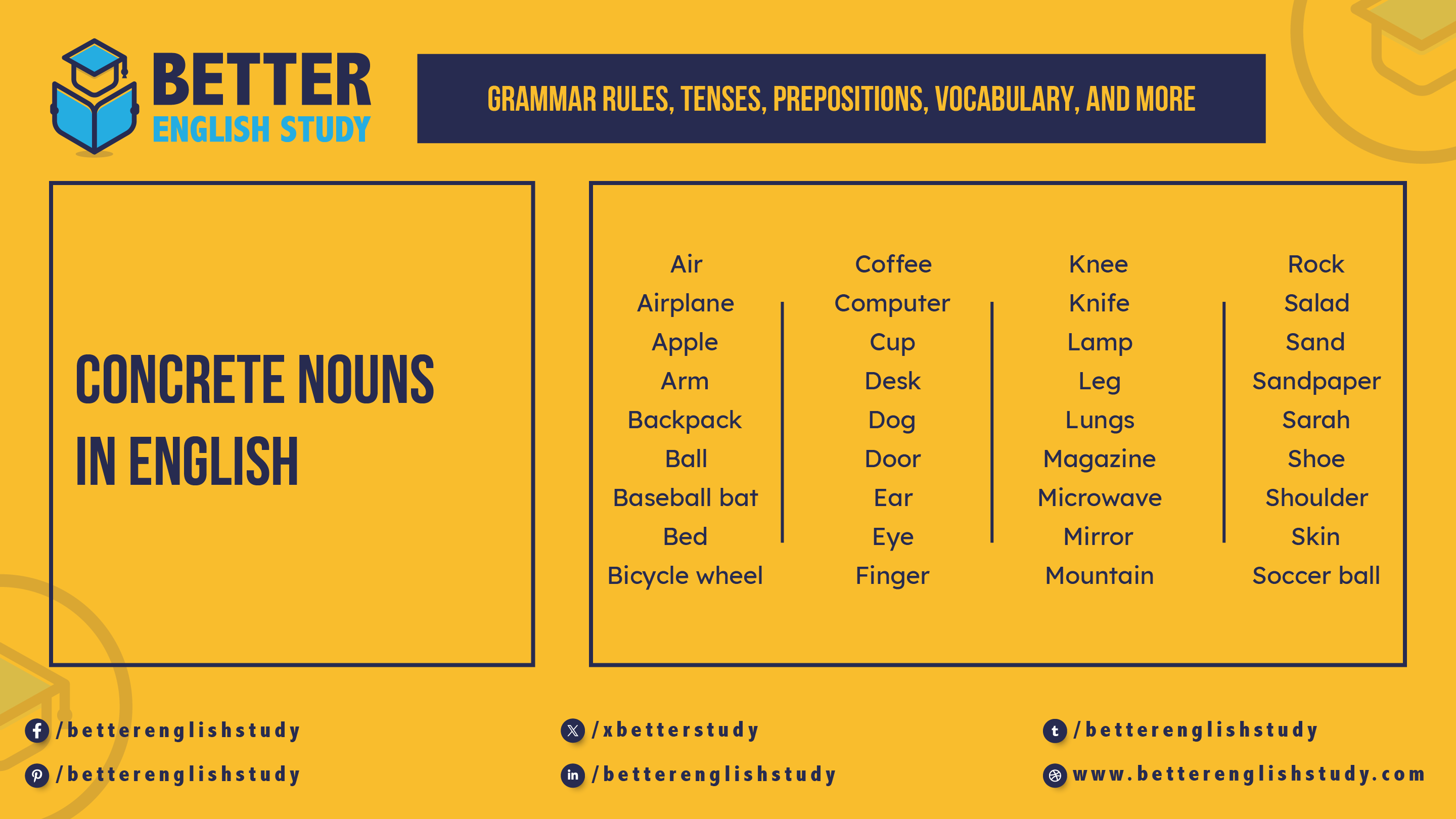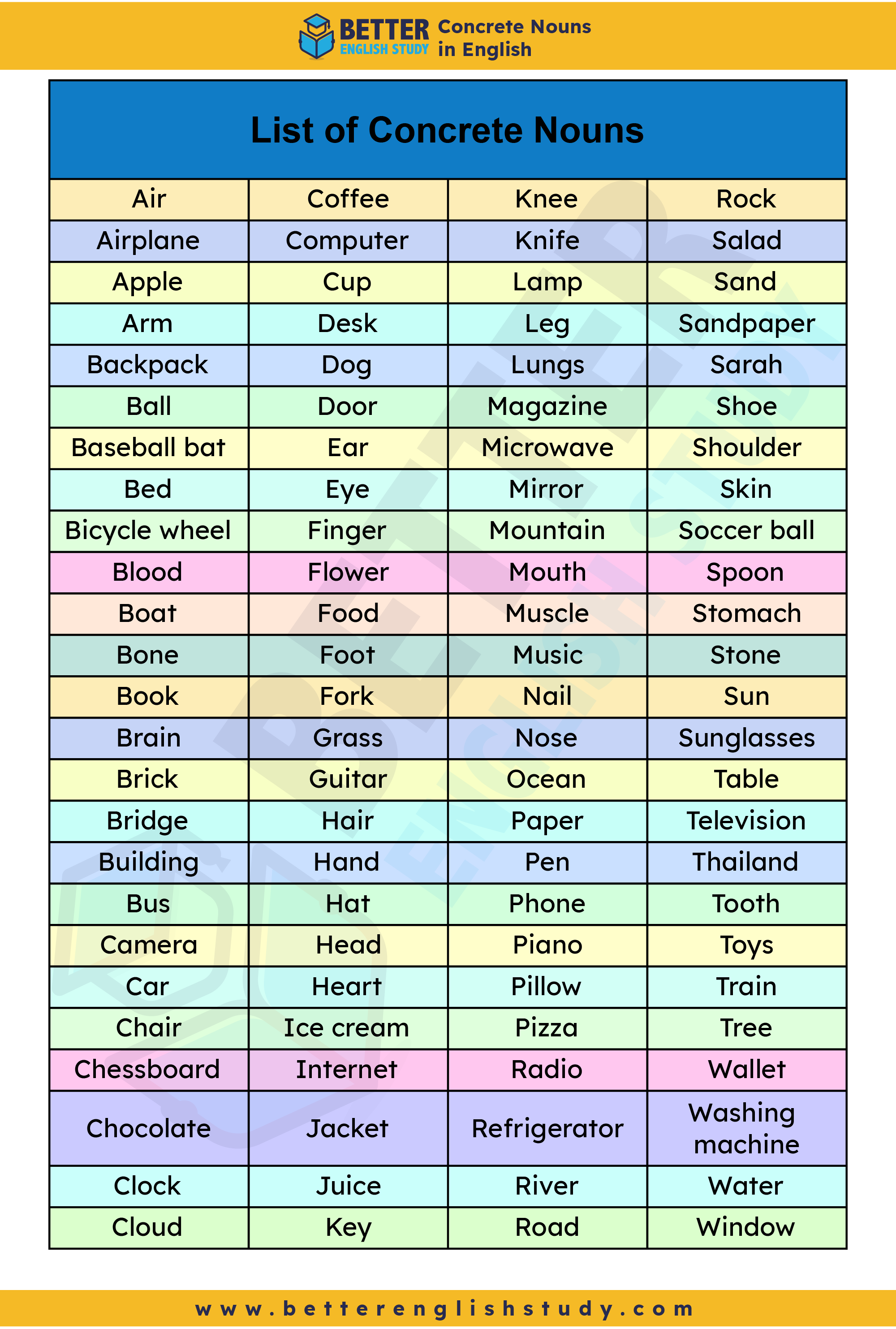
In the vast landscape of the English language, nouns play a crucial role in giving substance and structure to our expressions. One fascinating category within nouns is the concrete noun, which brings tangible entities to life through language.
In this exploration, we’ll dive into the essence of concrete nouns, understanding what they are, how they engage our senses, and providing examples to illuminate their significance.
Defining Concrete Nouns
A concrete noun is a linguistic term that describes a physical entity perceivable by the five senses: sight, touch, hearing, smell, and taste. These nouns can refer to a wide range of things, places, or living beings that have a tangible existence in the physical world.
Whether it’s an inanimate object like a “table” or a living creature like a “cat,” concrete nouns ground our language in the palpable reality of the world around us.
Identifying Concrete Nouns
A concrete noun is a person, place, or thing that can be experienced through sensory perception. This means they are physical entities that can be seen, touched, heard, smelled, or tasted. The richness of concrete nouns lies in their ability to evoke a sensory experience in our minds, making our language vivid and relatable.
For instance, you can see and touch a “phone,” making it a concrete noun. Similarly, you can hear the bustling sounds of “the hospital,” envision the scenic beauty of “Thailand,” or feel the soft fur of a “cat.” Concrete nouns bridge the gap between language and sensory experience, making communication more immersive and engaging.
List of 100 Concrete Nouns
| Air | Coffee | Knee | Rock |
| Airplane | Computer | Knife | Salad |
| Apple | Cup | Lamp | Sand |
| Arm | Desk | Leg | Sandpaper |
| Backpack | Dog | Lungs | Sarah |
| Ball | Door | Magazine | Shoe |
| Baseball bat | Ear | Microwave | Shoulder |
| Bed | Eye | Mirror | Skin |
| Bicycle wheel | Finger | Mountain | Soccer ball |
| Blood | Flower | Mouth | Spoon |
| Boat | Food | Muscle | Stomach |
| Bone | Foot | Music | Stone |
| Book | Fork | Nail | Sun |
| Brain | Grass | Nose | Sunglasses |
| Brick | Guitar | Ocean | Table |
| Bridge | Hair | Paper | Television |
| Building | Hand | Pen | Thailand |
| Bus | Hat | Phone | Tooth |
| Camera | Head | Piano | Toys |
| Car | Heart | Pillow | Train |
| Chair | Ice cream | Pizza | Tree |
| Chessboard | Internet | Radio | Wallet |
| Chocolate | Jacket | Refrigerator | Washing machine |
| Clock | Juice | River | Water |
| Cloud | Key | Road | Window |

Examples of Concrete Nouns in a Sentence
Let’s explore some examples across different categories to understand the breadth of concrete nouns:
- Table: The big brown table is where we eat dinner.
We can see and touch the table, so it’s a concrete noun.
- Phone: I have a shiny new phone.
The phone is something I can hold and see, making it a concrete noun.
- Cat: The fluffy cat is sleeping on the chair.
The cat is a natural, living thing we can see and touch, making it a concrete noun.
- Hospital: We go to the hospital when we’re not feeling well.
The hospital is a real place we can visit, so it’s a concrete noun.
- Thailand: My friend went on vacation to Thailand.
Thailand is a faraway place we can imagine, so it’s a concrete noun.
- Sarah: Sarah is my friend, and she likes to play.
Sarah is a real person we can talk to and see, so she’s a concrete noun.
- Air: We feel the breeze in the air when we’re outside.
Even though we can’t see it, we can feel the air, making it a concrete noun.
- Music: We dance to the happy music.
We can hear and enjoy music, so it’s a concrete noun.
- Book: I like to read a bedtime book every night.
The book is something I can hold and read, making it a concrete noun.
- Coffee: The yummy smell of coffee wakes me up.
Coffee is a tasty drink we can smell and taste, so it’s a concrete noun.
Even intangible concepts like emotions or abstract ideas become concrete when they manifest physically, such as feeling the warmth of love or hearing the laughter of joy.
In conclusion, concrete nouns form a cornerstone of our language, bringing the tangible world to life through words. These nouns, representing things, places, or living beings, engage our senses and bridge language and the physical reality surrounding us.
From the touch of a “book” to the aroma of “coffee,” concrete nouns enrich our communication by inviting us to experience the world through the prism of the senses.
So, the next time you encounter a concrete noun, take a moment to appreciate its ability to make language a vibrant and sensory immersive experience.
